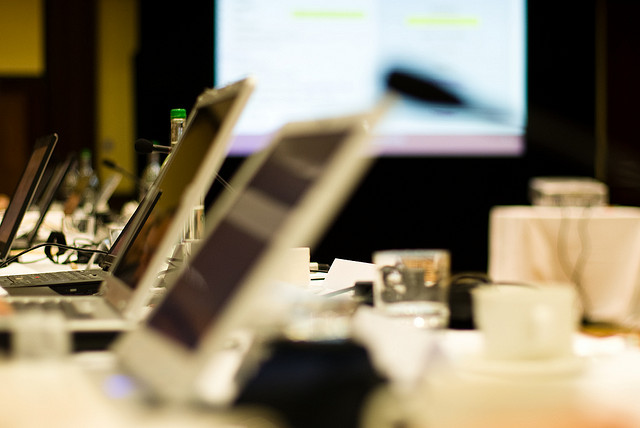I’ve been testing a new tactic lately. It’s called “listening.”
Here’s my strategy. When I go to a meeting, I sit down, take out my pen and paper, and, you know, listen to the people talking in said meeting.
It’s a groundbreaking approach, I realize. But, it’s one I intend to stay with. You see, I’ve had it with people (including myself, mind you) who are constantly checking their phones or laptops in meetings.

According to a recent survey, 41 percent of marketers multi-task in meetings. Almost half! That’s insane, my friends.
Let’s think about this logically for a second–and from a business perspective.
You’re invited to a meeting within your company–most likely because you have a vested interest in the project being discussed, or you need to contribute something to the meeting.
You accept the invitation and make a decision to attend the meeting.
You attend the meeting, but you bring your laptop, promptly open it and monitor email during the entire course of the meeting (I tend to think this is fairly common among those 41 percent mentioned above).
You may even RESPOND to an email or two during the meeting.
Sure, you ask a question or two during the meeting. You even contribute, when asked. But, for the most part you’re trying to do two things at once. And, I would even argue you’re most likely putting more brainpower toward the email than you are toward the meeting.
Here’s why this is a bad idea.
1) It’s hard to do two things at once. Oh sure, I know some people have it all figured out. You can chew gum and rub your tummy at the same time–good for you! 🙂 But, in all seriousness, your brain isn’t wired to focus on multiple things at once. Something will slip. Eventually. (Side note: Apparently, I’m not alone in this thinking: Clay Shirky recently demanded his students put away laptops during lectures–and lays out his case as to why pretty eloquently here last week).
2) The meeting organizer asked you to the meeting because she wanted your brain in the room. Not 20% of your brain. Not 40% of your brain. 100% of your brain! You owe it to your employer to fulfill that obligation.
3) You may miss a chance to shine or contribute. Since you’re paying more attention to your email machine, you most likely will miss an opportunity to contribute new information to the conversation–or, better yet for you, to shine in front of our colleagues by adding insight that could potentially turn a project around. Remember again: THIS IS WHY YOU’RE IN THE ROOM!
Now again, I’ve been just as guilty of this in the past as those 41% mentioned above. But, I’m stopping that practice effective today (officially, I started on Sept. 1).
And so far the results have been noticeable:
1) I’m contributing much more. I find myself (surprise, surprise) much more engaged in the discussion and actually feel much better at the end of the meeting knowing I contributed fully.
2) I’m finding additional ways to add value for my clients. By listening more intently and NOT multi-tasking during meetings, I’m able to uncover hidden gems of information I can then use to deliver more value for my clients. Not that this wasn’t happening before–I just find it happening more often recently. I credit that 100% to my NOT multi-tasking during these meetings.
3) My meeting notes are more valuable. OK, so I’m one of 5 people left who take hard copy meeting notes (I’ve come full circle on this), but those notes have proven invaluable in the days following meetings. I’ve referenced back to them many times–often to find information I use in planning docs, content and summaries. If I were multi-tasking, these notes would be haphazard at best.
So, the no multi-tasking strategy is working well for me so far. Now, I’d like to issue a challenge.
Try NOT multi-tasking in meetings for ONE WEEK.
Just one week.
See if you can do it. See how it turns out. See how it impacts your work life. You might be surprised how more engaged you feel–and how little you actually miss by not having your computer or phone on in meetings.
Please report back with your findings.

0 Comments